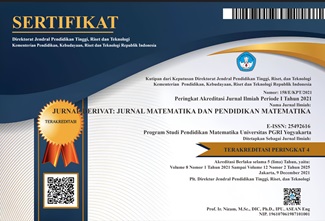EFEKTIFITAS PENDEKATAN PEMBELAJARAN MATEMATIKA REALISTIK INDONESIA (PMRI) UNTUK PENINGKATAN KEMAMPUAN BERFIKIR MATEMATIS SISWA
DOI:
https://doi.org/10.31316/j.derivat.v1i2.108Abstract
Penelitian ini bertujuan untuk mengetahui efektivitas model PMRI dengan model pembelajaran kooperatif untuk peningkatan keterampilan berfikir matematis siswa. Melalui pembelajaran matematika, siswa diharapkan memiliki kemampuan berfikir logis, analitis, sistematis, kritis, dan kreatif, serta memiliki kemampuan bekerjasama. PMRI adalah model pembelajaran yang bertitik tolah dari hal-hal yang real bagi siswa, menekankan keterampilan “proses of doing mathematicsâ€.
Penelitian ini merupakan penelitian jenis penelitian Quasi-Experimental, dimana kelas kontrol diberikan perlakuan pembelajaran matematika melalui model kooperatif, sedangkan kelas eksperimen diberikan perlakuan model PMRI.
Berdasarkan Muhammadiyah 3 Yogyakarta untuk rata-rata nilai post test berfikir matematis kelompok eksperimen adalah 83.22 sedangkan untuk kelompok kontrol 58.58. Sedangkan di SMP Negeri 16 Yogyakarta nilai post test berfikir matematis kelas eksperimen sebesar 75.65, dan kelas kontrol 54.45. Berdasarkan hasil uji hipotesis perbedaan kemampuan berfikir kritis menggunakan uji t (independent samples T-Test) diperoleh nilai signifikan 0,000 dengan taraf signifikan 2%, diperoleh kesimpulan Ho ditolak, sehingga terdapat hasil perbedaan antara kelompok eksperimen setelah dikenakan Model PMRI. Berdasarkan uji pengaruh model pembelajaran masing-masing diperoleh t hitung di SMP Muhammadiyah 3 Yogyakarta 0,292 dan SMP Negeri 3 Yogyakarta 0,346 dimana semua nikai tersebut lebih besar dari t tabel, sehingga Ho dengan hipotesis terdapat pengaruh model PMRI terhadap peningkatan kemampuan berfikir matematis.
Kata kunci: Model Kooperatif, Model PMRI, Kemampuan Berfikir Matematis
Downloads
Published
Issue
Section
Citation Check
License
Authors who publish with this journal agree to the following terms:
-
Authors retain copyright and grant the journal right of first publication with the work simultaneously licensed under a Creative Commons Attribution-ShareAlike 4.0 International License that allows others to share the work with an acknowledgment of the work's authorship and initial publication in this journal.
- Authors are able to enter into separate, additional contractual arrangements for the non-exclusive distribution of the journal's published version of the work (e.g., post it to an institutional repository or publish it in a book), with an acknowledgment of its initial publication in this journal.
- Authors are permitted and encouraged to post their work online (e.g., in institutional repositories or on their website) prior to and during the submission process, as it can lead to productive exchanges, as well as earlier and greater citation of published work (See The Effect of Open Access).







